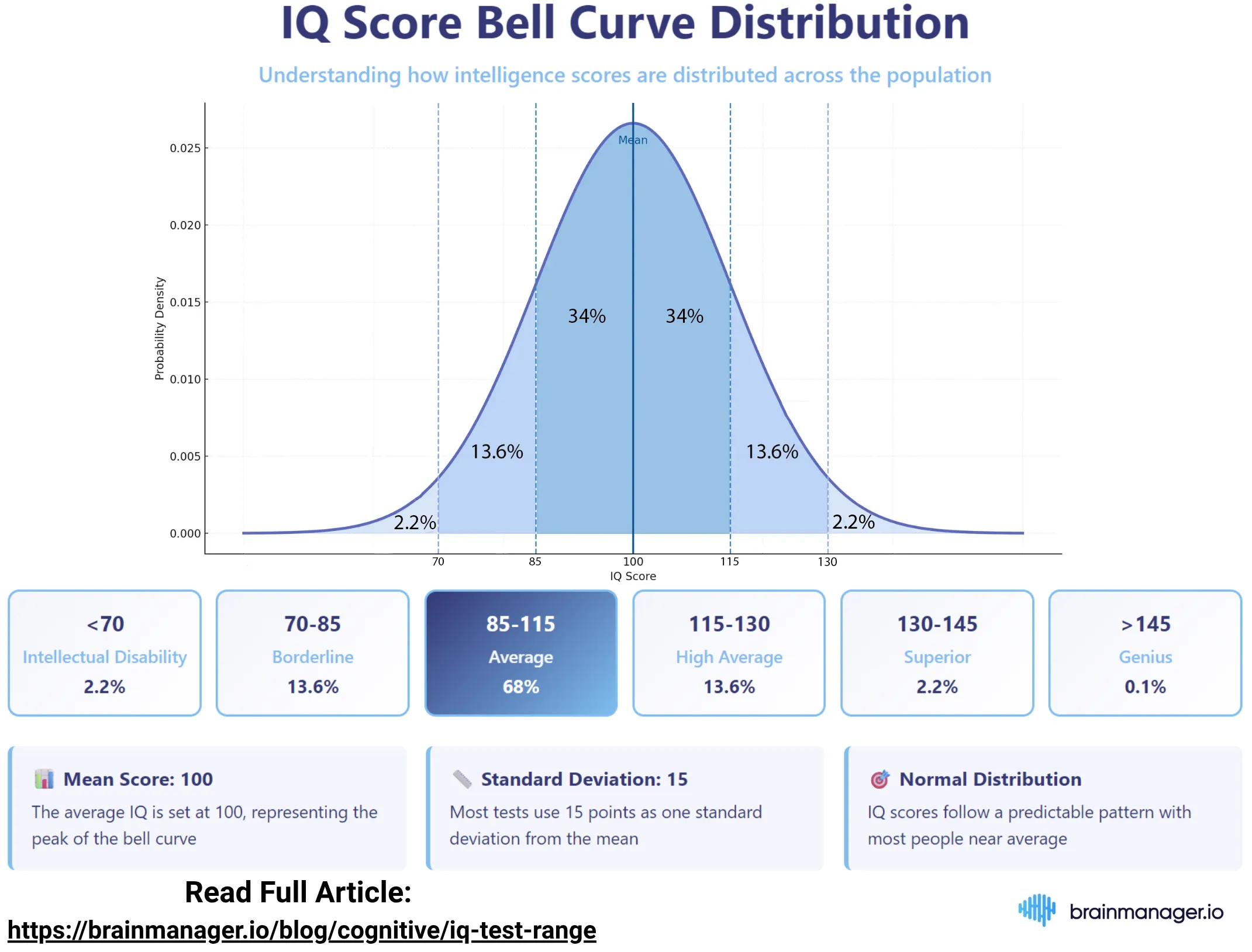What Country Has the Lowest IQ? Exploring the Countries with the Lowest Average IQ Scores
Are you curious about the countries with the lowest IQ scores? In this article, we explore the 11 nations with the lowest average IQs, discuss the socio-economic and cultural factors influencing these results, and highlight the challenges behind the numbers. Gain a deeper understanding of how education, health, and other factors shape cognitive potential worldwide.


Back
6 mins read
It’s natural to wonder how we measure up when it comes to intelligence. Whether comparing ourselves to family, friends, or strangers, intelligence sparks curiosity and debate.
But have you ever wondered how countries measure up on a global scale?
Measuring intelligence across nations is no simple task. While IQ tests aren’t perfect measures of cognitive ability, they offer a glimpse into how we process information and solve problems. On most standardized tests, the average IQ is set at 100, with scores above or below that indicating higher or lower intelligence.
While some countries are celebrated for high IQ scores, what about those at the opposite end of the spectrum? Are there countries where IQ scores consistently fall lower, and what factors contribute to these differences?
What Country Has the Lowest IQ in the World?
Nepal has one of the lowest average IQ countries in the world, reported at 42.99.
However, it’s important to note that IQ scores are influenced by various factors and should not be seen as definitive measures of intelligence. IQ tests reflect conditions such as access to education, nutrition, healthcare, and cultural context, which can all shape test outcomes. Additionally, socio-economic and political factors also contribute to national IQ averages, though these relationships are not universally accepted.
Richard Lynn and Tatu Vanhanen, authors of IQ and the Wealth of Nations, argue that there is a correlation between national IQ scores and economic development, suggesting that countries with high average IQ scores tend to be more prosperous. However, this theory has been widely criticized for methodological issues and potential biases, meaning their findings should be interpreted with caution.
While 42.99 remains the more widely accepted figure for Nepal’s IQ, it’s worth noting that some studies, such as those referenced by Worlddata.info, report a higher average IQ of 51. This discrepancy underscores how differing methodologies and sample sizes can lead to variations in reported IQ scores.
Word of Caution: Interpreting Low IQ Scores Across Countries
Before reviewing the countries with the lowest average IQ scores, it's important to understand what these scores actually reflect. An IQ below 70 is often labeled as a Moderate Mental Disability, but such labels don't tell the full story.
IQ tests are limited by cultural bias and don’t measure all forms of intelligence. They often ignore abilities like contextual reasoning (Steinberg’s Triarchic Theory) or interpersonal skills (Gardner’s Multiple Intelligences), as well as emotional and social intelligence.
Low average IQ scores in some nations often reflect systemic barriers, like poor access to education or healthcare, rather than a true lack of cognitive ability. Many individuals still thrive within their communities despite these scores.
IQ alone can’t define a population’s potential. With better opportunities, cognitive development improves, showing why IQ isn’t the full picture.
Countries with the Lowest IQ Scores
Understanding a country's average IQ score requires looking beyond the numbers. As we have discussed, IQ scores can offer insights into access to education, nutrition, and healthcare, but they don't capture the full potential or intelligence of a nation’s people.
The rankings here are based on data from multiple reputable sources. We have carefully researched and cross-referenced studies, including IQ and the Wealth of Nations by Richard Lynn and Tatu Vanhanen, along with more recent reports from the World Population Review and Datapandas.org. This approach ensures our findings reflect a comprehensive view of global IQ rankings, supported by both historical and up-to-date data.
Here are the countries with the lowest average IQ scores, ranked by their reported averages:
- South Sudan — Average IQ: 58.61
- Ghana — Average IQ: 58.16
- Ivory Coast — Average IQ: 58.16
- Guinea — Average IQ: 53.48
- Nicaragua — Average IQ: 52.69
- Gambia — Average IQ: 52.68
- Cape Verde — Average IQ: 52.5
- Guatemala — Average IQ: 47.72
- Sierra Leone — Average IQ: 45.07
- Liberia — Average IQ: 45.07
- Nepal — Average IQ: 42.99
Now that we have the numbers, let’s explore the factors influencing these scores, including education, socio-economic conditions, health, and political stability. Each country tells a unique story about the conditions that shape cognitive development and opportunities for improvement.
1. South Sudan’s average IQ is 58.61.
South Sudan, a nation with a rich history and vibrant cultural heritage, faces significant challenges that impact its reported average IQ. Years of conflict and political instability have strained the country's resources, limiting access to education, healthcare, and basic infrastructure. Despite ongoing efforts to improve its educational system, poverty and resource scarcity continue to hinder progress.
IQ tests are often criticized for cultural bias, and this may be particularly relevant in South Sudan, where cultural and linguistic diversity could affect test performance.
2. Ghana’s average IQ is 58.16.
Ghana, a country in West Africa, has made substantial progress in improving its education and healthcare systems. However, the country's average IQ score of 58.16 still falls below the global average.
The primary factors contributing to this score include poverty, limited access to quality education and healthcare, and persistent socio-economic disparities.
3. Ivory Coast’s average IQ is 58.16.
Ivory Coast has made significant investments in education and training programs, yet the country’s average IQ score remains low. Major challenges, including socioeconomic disparities, high poverty rates, political instability, and inadequate healthcare, continue to hinder progress.
With a population of over 26 million, providing accessible and quality education for all is a considerable challenge.
4. Guinea’s average IQ is 53.48.
Guinea’s low average IQ score can be linked to its weak economy, political instability, inadequate infrastructure, and underdeveloped education systems. In 2021, the primary school completion rate was just 56% for girls and 70% for boys, according to the UNESCO Institute of Statistics (UIS data), reflecting significant challenges in educational access.
5. Nicaragua’s average IQ is 52.69.
Economic instability and educational challenges significantly impact Nicaragua's average IQ. The country has faced persistent economic difficulties, including high levels of poverty and unemployment, which have hindered efforts to provide quality education and healthcare.
6. Gambia’s average IQ is 52.68.
Gambia, celebrated for its rich cultural heritage, music, dance, and traditional festivals, faces significant challenges that contribute to its lower average IQ. The country struggles with poverty and limited resources, particularly in education and healthcare, which are critical to cognitive development.
7. Cape Verde’s average IQ is 52.5.
Cape Verde, an island nation off the coast of West Africa, has made significant strides in improving its education systems in recent years. However, the country continues to face challenges stemming from its small size and limited resources.
The reported average IQ score may not fully reflect the cognitive potential of Cape Verde's population but highlights areas where educational support and resources could be further strengthened.
8. Guatemala’s average IQ is 47.72.
Guatemala, a country in Central America with a population of approximately 18 million, faces significant challenges contributing to its low average IQ score. Limited access to quality education and inadequate healthcare are among the primary factors. High poverty rates exacerbate the issue, with many children forced to drop out of school to work at a young age, limiting their educational and cognitive development.
9. Sierra Leone’s average IQ is 45.07.
Sierra Leone faces significant challenges that contribute to its low average IQ score of 45.07. The country has endured a brutal civil war, outbreaks of deadly diseases like Ebola, and ongoing economic instability, all of which have hindered progress in education and healthcare.
10. Liberia’s average IQ is 45.07.
As with other nations facing significant socio-economic challenges, Liberia's history of prolonged civil war and political instability underscores the profound impact that external factors can have on cognitive development. The lack of access to essential services like education, combined with high poverty rates, has contributed to low IQ scores in Liberia.
Beyond educational setbacks, Liberia also faces substantial challenges in nutrition and healthcare. A report by the World Food Programme found that 22% of children under five suffer from chronic malnutrition, which affects physical development and also significantly hinders cognitive growth.
11. Nepal’s average IQ is 42.99.
Nepal, with an average IQ score of 42.99, is often considered the country with one of the lowest IQ scores in the world. Its low average IQ can be attributed to several factors beyond the conventional understanding of intelligence. These challenges reflect not just the country’s educational shortcomings but also broader socio-economic and environmental conditions.
Nepal’s education system has historically been underfunded and underdeveloped, particularly in rural areas where much of the population resides. According to estimates from the World Bank, Nepal's literacy rate is only 63.3%, with significant disparities between genders and urban versus rural areas. This signifies that many children in these regions lack access to quality education, contributing to a persistently low literacy rate.
Closing Thoughts
Human intelligence is complex, and while IQ tests can provide insights into education, health, and socio-economic conditions, they don’t capture a population's full cognitive abilities.
Cultural bias and the narrow scope of IQ tests limit their accuracy. These tests fail to account for factors like social and emotional intelligence, creative thinking, analytical skills, and practical problem-solving, often overlooking the broader influences of environment, culture, and personal experiences.
The findings in this report emphasize that IQ scores should not be the sole measure of a population's potential.
Instead, investing in education, addressing poverty and inequality, and promoting inclusive personal growth are key to unlocking a nation’s true capabilities.


Return to Blog











